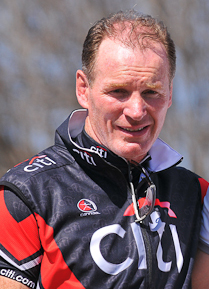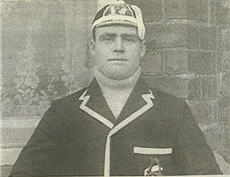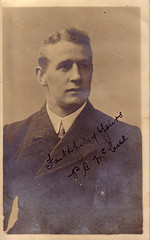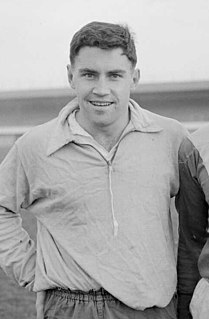Mark Gordon Ella, AM is an Australian former rugby union player, often considered as one of his country's all-time greats in that sport. In a relatively short career, Mark Ella established himself as one of the all-time greats in world rugby union.

Simon Paul Poidevin is a former Australian rugby union player.

The Webb Ellis Cup is the trophy awarded to the winner of the Rugby World Cup, the premier competition in men's international rugby union. The Cup is named after William Webb Ellis, who is often credited as the inventor of rugby football. The trophy is silver gilt and has been presented to the winner of the Rugby World Cup since the first competition in 1987. It has been held three times by New Zealand, twice by Australia and South Africa, and once by England in 2003.
John Edward Thornett, MBE was an Australian rugby union player, who played 37 Tests for Australia between 1955 and 1967 and made an additional 77 representative match appearances. He captained Australia in 16 Test matches and on an additional 47 tour matches on the eight international rugby tours he made with Wallaby squads.
Robert Emmett Honan is an Australian former rugby union and rugby league footballer of the 1960s and 1970s - a dual code rugby international.
The McLean family were an Australian rugby clan who between them played 77 Tests for the Australian national rugby union team and a number of Tests for the Australian national rugby league team.

Jack 'Darb' Hickey was a pioneer Australian rugby union and rugby league footballer and represented his country at both sports. He was one of Australia's early dual-code rugby internationals. He competed in the 1908 Summer Olympics in rugby union and was notable for scoring the first ever try for the Australian national side in a rugby league test match.

Charles "Boxer" Joseph Russell was a pioneer Australian rugby union and rugby league footballer and coach. He represented his country in both sports and was one Australia's early dual-code rugby internationals. He was a gold medallist at the 1908 Summer Olympics.

John Thomas "Towser" Barnett was a pioneer Australian rugby union and rugby league footballer and won an Olympic gold medal winning in rugby at the 1908 Summer Olympics. He was one of Australia's early dual-code rugby internationals.
Robert Henderson Graves was a pioneer Australian rugby league and rugby union player and one of his country's first dual-code internationals. He was a versatile forward for the Australia national team. He played in 6 Tests between 1908 and 1909, as captain on 1 occasion. In 1907 he played for New South Wales in the very first rugby match run by the newly created 'New South Wales Rugby Football League' which had just split away from the established New South Wales Rugby Football Union.

Patrick Aloysius "Paddy" McCue was an Australian representative rugby union player and pioneer rugby league footballer. He was a dual-code rugby international and an Olympic gold medallist.

Peter Harold Boyne Burge was an Australian rugby footballer and coach. He represented his country in both rugby league and rugby union. The eldest of the four Burge brothers, Peter was one of the first Australian dual-code rugby internationals.
Colin "Col" Windon, was a rugby union player and soldier who captained Australia – the Wallabies – in two Test matches in 1951. By age 18 Windon was playing at flanker for his club Randwick in Sydney's Shute Shield. After serving with the Second Australian Imperial Force in the Pacific Theatre during the Second World War, Windon resumed his rugby career in 1946. He was first selected for Australia for their tour of New Zealand that year. Despite the Wallabies losing both their Tests on tour, Windon impressed with his play.

The first clash in rugby union between Australia and New Zealand took place in a test match on 15 August 1903 in Sydney, New South Wales. On that occasion, New Zealand won by 22-3.
The 1908–09 Australia rugby union tour of the British Isles was a collection of friendly rugby union games undertaken by the Australia national rugby union team against invitational and national teams from England and Wales, as well as several games against sides from North America. This was the first Australian tour of the Northern Hemisphere and the side is sometimes referred to as the "First Wallabies".
Robert Briton Loudon was a New Zealand born rugby union player, a flanker who made twenty-three representative appearances for the New South Wales state team in the 1920s. Seven of these matches have since been decreed as Test matches by the Australian Rugby Union and Loudon, who led the side in one such match in 1928, was therefore a captain of the Australian national team. After rugby union restarted in Queensland in 1929, and national selections were made from the two states Loudon played in six further full Australian Wallaby Test sides. In addition to his thirteen Test matches he made a further twenty-one tour match appearances for representative Australian sides on three international tours between 1923 and 1933.

Robert Esmond McMaster, also known by the nickname of "Wallaby Bob", was an Australian wrestler, rugby union and professional rugby league footballer. He played in the 1940s and 1950s, and was a wrestling referee in the 1960s and 1970s. He played representative level rugby union (RU) for Australia, and at club level for Brothers Old Boys, as a prop, i.e. number 1 or 3, and representative level rugby league (RL) for Other Nationalities and British Empire, and at club level for Leeds and Past Brothers, as a prop, i.e. number 8 or 10.
The 1982 Australia rugby union tour of New Zealand was a series of fourteen matches played by the Australia national rugby union team in New Zealand between July and September 1982. The Wallabies won ten of the fourteen matches and lost the other four. The international match series against the New Zealand national rugby union team resulted in a 2–1 win for New Zealand, who won the first and third matches, with Australia winning the second match. New Zealand thereby regained the Bledisloe Cup, which had been held by Australia since 1979.

Peter George Johnson was an Australian international rugby union player. He enjoyed a long state and international career throughout the 1960s and made 92 national appearances for his country. He captained the Australian side in five Test matches.











